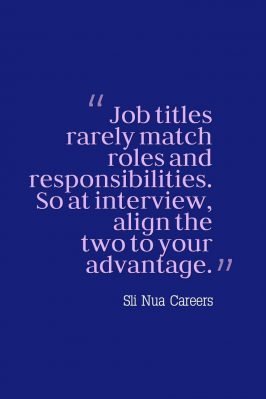Pic source www.pixabay.com
Job Title
By Sabina Trench, Career Coach, Sli Nua Careers

You have been called to interview for a relatively senior position. However, your current job title does not reflect the extent of your duties and responsibilities. This is a common problem for many people, and there are ways to get around this in interview, writes SABINA TRENCH, Career Coach, Sli Nua Careers,
Your introduction
At the start of the interview, you may get the opportunity to talk yourself or your CV. This could be a good time to tell the panel about the mismatch in the job title. For example ‘while my title is General Operative, I also supervise the nightshift in the absence of senior management, train new staff and help with distribution when things get really busy’.
In some cases your role and responsibilities will extend far beyond your title, and if this is the case, let them know early and often throughout the interview.
 Back it up
Back it up
Like the example given above, you must be able to give clear examples of times when you went beyond your title. However, it is important to highlight that any extra work you do is with the permission of your manager or supervisor. Initiative is one thing: solo runs are another.
Referee’s word
Make sure that you confirm in the interview that your referee/manager will back up any statements you make about your workload and extra responsibilities. I have encountered many people who say they are working beyond their title, but in some cases they are engaging in wishful thinking rather than hard reality.
Closing statement
Making your final case for the job is your last opportunity to convey that you are doing more than it says on the tin. While it shouldn’t be the sum total of your final pitch, it certainly should be a strong part of it. Your willingness to show initiative,
Making your final case for the job is your last opportunity to convey that you are doing more than it says on the tin. While it shouldn’t be the sum total of your final pitch, it certainly should be a strong part of it. Your willingness to show initiative, row in on other projects or in other departments when it gets busy, or take on duties over and above your pay grade, is an advantage in the workplace. It is not a common quality and could give you the edge at interview.
Addressing the mismatch
Even though your title isn’t at the same level as the job you applied for, it is a good sign that you have been called to interview. The potential employer has obviously seen something in your CV or application form that interests them.
However, maybe it’s time to approach your boss about a new title. This doesn’t have to include a pay rise, but in the job-searching world, titles matter. Make sure it is a meaningful title that will make sense outside of your current organisation.
Who knows how many applications you have sent out where your title was the difference between being called for interview and not? At the very least, it’s worth having the conversation.
Job Title
Focus on your competencies and skills on the first page of your CV. This helps to deflect attention from job titles.
A good place to showcase projects you have worked on. LinkedIn tends not to focus so much on titles.
Job titles rarely match roles and responsibilities. So at interview, it is up to you to align the two to your advantage.
If you would like to make a booking with any of our career coaches, see HERE for CV Preparation, Application Form writing, LinkedIn Profile writing, Interview Training and other career services.
You can read more blogs from Sabina HERE
Sabina Trench is a Career Coach with Sli Nua Careers, who have offices in Enniscrone, Galway, Limerick, Athlone, Sligo and Mayo, plus a full online service. Their services include CV preparation, interview training, personal statements and application forms.
